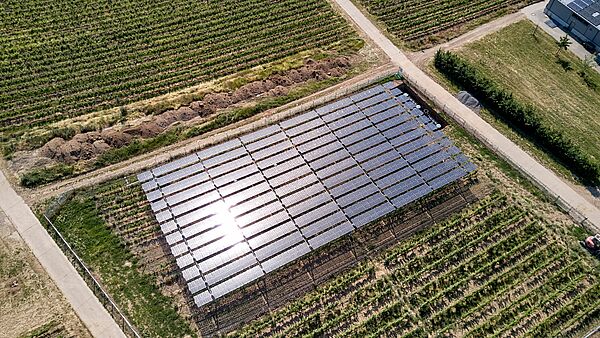The Leibniz Centre for Agricultural Landscape Research will open an Innovationszentrum für Agrarsystemtransformation (IAT; Innovation Center for the Transformation of the Agricultural System) with locations in Brandenburg and Hesse, including a station at Hochschule Geisenheim University. The proposal was approved by the Gemeinsame Wissenschaftskonferenz on November 22, 2024, but is still subject to the approval of the corresponding 2026 budget.
The IAT is intended to promote the transition to sustainable and resilient agricultural and food systems. Real-world laboratories will be established to help achieve this goal, which allow for research to be conducted under practical, complex conditions as opposed to the controlled, standardized conditions of purely scientific projects. The research questions will be developed in cooperation with local stakeholders from the outset, and potential solutions will be jointly tested and analyzed.
Three of the five planned real-world laboratories will be established in Hesse: The laboratory in the Rheingau region will focus on multifunctional, climate-resilient viticulture systems.
“Climate change, war, and a growing world population currently pose major challenges for agriculture. As part of a collaborative Hessian network, Hochschule Geisenheim University, the University of Kassel, and Justus Liebig University Giessen are conducting research into the agricultural and nutritional science issues of the future. The real-world laboratory at Hochschule Geisenheim University, with its focus on multifunctional, climate-resilient viticulture systems, will be able to draw on a wealth of expertise in the field of modern grapevine cultivation,” said Hesse’s Minister of Science, Timon Gremmels, on the plans for the innovation center.
Real-World Laboratory for Multifunctional and Climate-Resilient Viticulture Systems
Two working groups, including a new professorship for mixed crop systems in viticulture appointed jointly with the Leibniz Centre for Agricultural Landscape Research, have been established at Hochschule Geisenheim University as part of the new innovation center. These working groups aim, among other things, to investigate how to successfully grow grapevines and fruits, vegetables, quality timber, or wood for biomass production simultaneously. In addition, they will continue to explore the potential of photovoltaic systems for generating energy in vineyards and jointly develop strategies for improving climate protection and climate adaptation.
University President Professor Hans Reiner Schultz welcomed the official approval of the IAT: “This decision is a milestone for research into the transformation of specialty crop sites, including for viticulture and fruit growing, into more sustainable landscapes. We can only thank all the colleagues involved at the various locations of the innovation center for developing this real-world laboratory concept, as the many facets of this transformation process can only be mapped out and efficiently put into practice under real, practical conditions. This restructuring and its implementation under economically viable conditions is more urgent than ever before.”
Federal and State Funding
After the innovation center is launched in 2026, two coordination offices will be set up at the Leibniz Centre for Agricultural Landscape Research sites in Müncheberg and Giessen in 2027. The federal and state governments will provide the Leibniz Centre for Agricultural Landscape Research with additional funding of €9.5 million per year for the IAT, subject to certain conditions.
“Thanks to this permanent strategic expansion of the Leibniz Centre for Agricultural Landscape Research to include the IAT, we can now pursue this practical approach more intensively across a wider range of topics. Together with farmers and other non-scientific stakeholders, solutions will be jointly developed in these real-world laboratories that are scientifically sound and can be applied more efficiently,” says Professor Frank Ewert, Scientific Director of the Leibniz Centre for Agricultural Landscape Research.
Further Information (in German)
Hessischer Forschungsverbund Agrarsystemökologie - HFA Online



